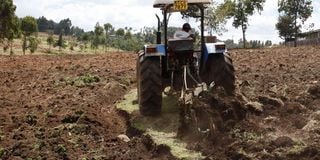Panic selling hits market on plan to import cheap maize

A tractor tills a farm in Elburgon, Nakuru County, on January 2, 2023, in preparation for the planting season. Farmers have started early preparation of their farms for the planting of short-term crops following the end of the Christmas and New Year festivities.
It is time to sell, and sell fast. Farmers in the North Rift region have just over three weeks left within which to offload their maize stocks or risk incurring huge losses on the back of the planned importation of duty-free grain.
President William Ruto recently announced that the government would allow farmers to sell their produce at the current prices of above Sh5,000 per 90-kilogramme bag ahead of the importation of duty-free maize and rice from February, part of efforts to avert a food crisis.
“One of my ministers had given you 72 hours to release the maize but I had to shelve the plans to give you priority. It is now time for you to sell the produce while the prices are high since we have to lower the cost of maize flour,” Dr Ruto told farmers on Christmas Day at the Eldoret Sports Club.
Trade Cabinet Secretary Moses Kuria had, in early December, issued a 72-hour ultimatum to maize farmers to release the produce to the market. He accused them of hoarding the produce, resulting in a rise in the prices of maize flour that hit highs of Sh200 per two-kilo packet.
“We have to sell the produce at the present competitive prices considering that the prices are likely to plunge once the imported cereals hit the market,” said Mr James Kosgei, a farmer in Sergoit, Uasin Gishu County.
Harvesting of maize is ongoing in parts of the North Rift region with the country projected to realise 30 million bags against an annual consumption of approximately 45 million bags.
The Ministry of Agriculture has allowed traders to import 900,000 tonnes of white maize and 600,000 tonnes of milled rice from next month to August this year.
“[This will] enable the country to have adequate stocks to last until the next harvest between July and August 2023. The duty waiver shall apply to white maize and milled rice imported into the country by August 6, 2023, by millers and traders,” said the State Department for Crop Development.
Disillusioned farmers
Maize prices have dropped from Sh5,800 to Sh5,200 as some of the disillusioned farmers release thousands of bags of grains to the market.
Trans Nzoia County realised an estimated 5.3 million bags of maize while it consumes about two million bags with an estimated 3.3 million being released to the market.
“We have sufficient maize stocks following bumper harvest this season and measures have been put in place to minimize post-harvest losses,” said Trans Nzoia County Agriculture Executive Phanice Khatundi. She decried the exploitation of farmers by middlemen, who, she said, have flocked to the region looking to purchase the produce at throw-away prices.
Read: Protect maize farmers
The Ministry of Agriculture forecasts this season’s maize harvest to be 20 per cent less than the projected 40 million 90-kilo bags. It is estimated at 32 million bags.
According to annual agriculture reports, Rift Valley has continued to experience low yield with production declining from 27 million bags to 21 million bags this season.
Uasin Gishu County is projected to harvest about 4.5 million bags of maize this season out of which more than 2.5 million bags will be released to the local market.





